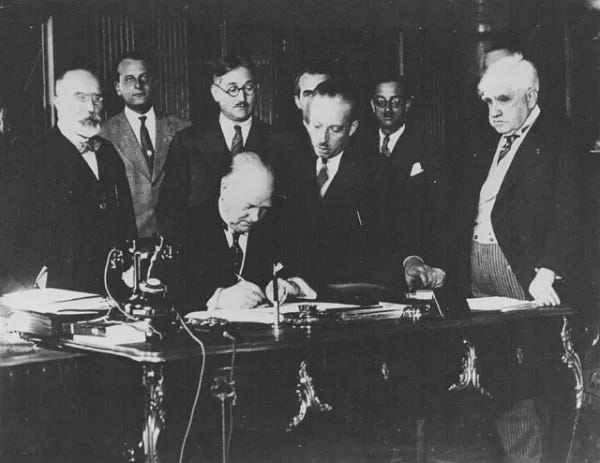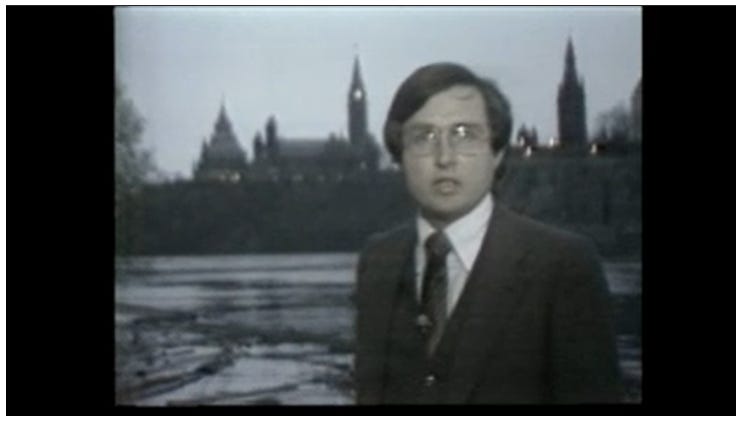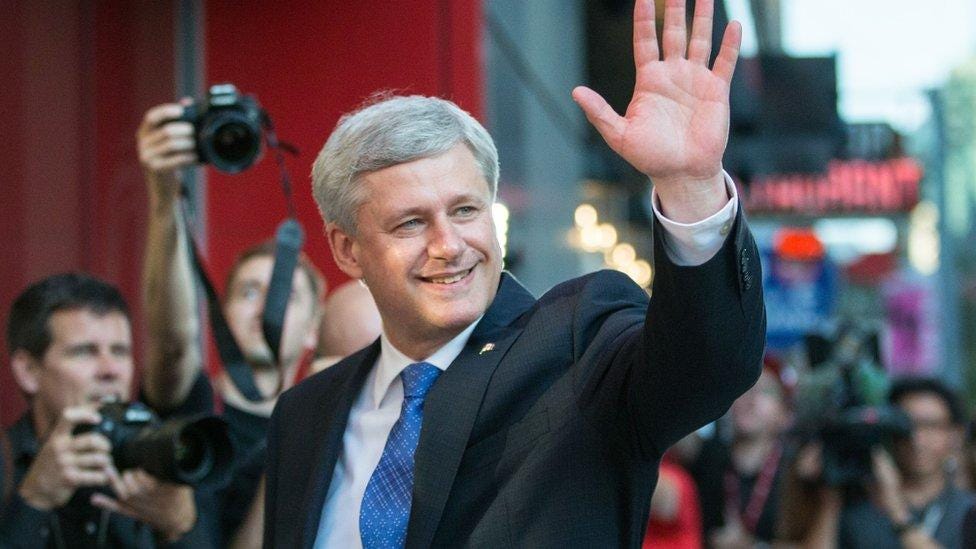The CBC Was Created by Conservatives to Stand Up to America. We Need It Now More Than Ever.
In the depths of the Great Depression, long before the CBC became a lightning rod in Canadian politics, it was a Conservative government that brought it into being—not as a luxury, but as a necessity.
The year was 1932. Prime Minister R.B. Bennett faced not only economic collapse but a country struggling to hear itself. Powerful American radio stations were flooding the Canadian airwaves. Their reach extended deep into Canadian homes, saturating the public with American content, values, and voices. Canadian stories were being drowned out. Canadian sovereignty—cultural and political—was at risk.
Bennett, a staunch nationalist and proud Conservative, understood that if we couldn’t hear ourselves, we’d eventually forget who we were. So his government passed the Canadian Radio Broadcasting Act, establishing the Canadian Radio Broadcasting Commission, the precursor to the CBC.

This wasn’t about partisanship. It was about survival—a vision of Canada that could resist being culturally absorbed by its larger neighbour. It was a pragmatic act of sovereignty: build a public broadcaster, or become one more indistinct voice in the static of American influence.
And it worked. The CBC would go on to become one of Canada’s most powerful tools for national cohesion—a platform for news, culture, sport, language, and memory that connected the country’s vast geography and diverse communities.
A Living Archive of Ourselves
One of the CBC’s most vital and underappreciated roles is as an archival institution—a living memory of the nation. From the 1930s onward, CBC journalists and crews captured the sounds and images of Canadian life as it unfolded, in real time. Their footage spans not just high politics and public ceremonies, but quiet, unvarnished slices of daily life: interviews in Cree and Inuktitut, student protests in Winnipeg, dockworkers in Halifax, the bustle of immigrant markets in Vancouver.

This isn’t nostalgia. It’s evidence. CBC’s archives allow us to study ourselves with clarity and care—to remember how we responded to crises, celebrated victories, mourned losses, and made change. It is no exaggeration to say that these archives are part of our national heritage.
But that work was put in jeopardy in 2012 when the Harper government imposed a series of sweeping cuts to the CBC’s budget. Among the least discussed—but most damaging—was the hollowing out of its archival services. Staff were let go. Preservation and digitization programs were slashed. Vast quantities of footage, especially regional and minority-language material, were never properly preserved or made accessible to the public.
This wasn’t just a budget line trimmed. It was a loss of institutional memory—one we may never fully recover.
A Window into Quebec
Nowhere is this issue more emotionally and politically charged than in Quebec, where Radio-Canada is not just a broadcaster but a cultural lifeline.
Outside of Montreal, particularly in remote and rural areas, Radio-Canada is often the only reliable provider of local news, Francophone arts coverage, and culturally relevant programming. Its journalists cover stories that private broadcasters won’t touch. Its radio hosts connect communities separated by geography and history. Its children’s programs, investigative documentaries, and regional newscasts are foundational to the province’s sense of self.
One archival gem, Les Beaux Dimanches, aired from 1966 to 2004 and exemplifies this mission. Through theater, documentaries, and live performance, it chronicled Quebec’s cultural flowering and helped shape the modern Francophone identity.
So when federal Conservatives speak of “defunding the CBC,” they are also threatening Radio-Canada. That message plays well in certain English-speaking regions. But in Quebec, it lands very differently. It’s perceived not just as a media cut—but as an attack on cultural autonomy.
Across the province, defending Radio-Canada is one of the few issues that can unite sovereigntists and federalists alike.
Canada in Stereo
CBC’s English-language programming has played a similarly important role in the rest of Canada. Flagship programs like The Nature of Things have been educating Canadians on science and the environment for generations. The Fifth Estate has delivered decades of investigative journalism. Kids in the Hall offered an irreverent, proudly Canadian take on comedy, and programs like Front Page Challenge documented our national conversations over nearly half a century.
Each of these programs, available in CBC’s archives, is a piece of our cultural DNA. But they’re also a reflection of who got to speak—and who didn’t.
That’s why it’s particularly important that CBC’s mandate now includes amplifying Indigenous voices. Programs produced in and by Indigenous communities, news coverage in Cree, Ojibwe, and Inuktitut, and partnerships with Indigenous creators are helping tell stories long excluded from mainstream coverage.
And it matters who tells the story. CBC North and regional bureaus in Manitoba, Saskatchewan, and the Yukon provide critical reporting on housing, healthcare, education, and sovereignty issues that affect Indigenous and rural communities alike. For many, CBC isn’t just the national broadcaster. It’s the only broadcaster.
Serving the West
In Canada’s West, where alienation from central institutions often runs high, CBC still plays a critical and underappreciated role. It connects rural communities, covers agricultural and resource-sector issues, and gives voice to perspectives often ignored by big media based in Toronto, Montreal, or Vancouver.
The idea that CBC is some kind of “Toronto elite” caricature ignores the work being done every day by local reporters in places like Prince George, Moose Jaw, Yellowknife, and Lethbridge. It also ignores that the CBC is often the only outlet covering rural issues from a Canadian perspective.
Whose News Is Fake?
The modern assault on the CBC didn’t begin with Donald Trump, but it borrowed liberally from his playbook. The “fake news media” chants, designed to delegitimize journalism and consolidate political loyalty, have been subtly echoed in Conservative Party of Canada messaging—with “Defund the CBC” lawn signs, attack ads, and fundraising emails.
This messaging is not just about budget priorities. It’s about trust. By painting the national broadcaster as biased or untrustworthy, political actors aim to discredit the very institution that might challenge their narrative. That has consequences not just for the CBC—but for any shared sense of truth in our democracy.
Why Harper Targeted the CBC
For the Harper government, the CBC was both a symbolic and strategic target. Ideologically, the public broadcaster was seen as a bastion of progressive or anti-conservative bias. But practically, cutting the CBC weakened an institution capable of scrutinizing power and amplifying dissenting voices. That suited a government eager to centralize communications and sideline traditional media.
The cuts weren’t just economic. They were a signal: this is a Canada where only market value matters.
Value(s) Beyond the Market
If Canada is to be resilient—politically, culturally, economically—we must be clear about what we value, and what we believe is worth sustaining. This is precisely the argument advanced by Mark Carney in his book, Value(s): Building a Better World for All.
Carney argues that modern capitalism must shift from maximizing shareholder value alone to maximizing stakeholder value. That means looking beyond quarterly profits and considering the long-term interests of the communities, cultures, and institutions that underpin a healthy society.
The CBC is a textbook case of stakeholder value. It doesn’t exist to deliver financial returns to investors. It exists to deliver cultural, democratic, and social returns to the Canadian people. Its stakeholders are not shareholders—they are citizens.
The value it creates is difficult to price, but indispensable to preserve.
The Path Forward
Defending the CBC does not mean treating it as beyond criticism. Quite the opposite. The CBC must continue to evolve, to better reflect the full diversity of Canada’s voices—including those on the political right. Many Canadians feel their values and viewpoints are underrepresented in national conversations, and if CBC is to be truly national, it must take that seriously.
There are ways to address this constructively. Through regional partnerships. Through more transparent editorial processes. Through open dialogue with communities who feel left out. What we don’t need is the "burn it down" approach offered by Pierre Poilievre—an approach that seems more invested in tearing down than building up.
We’ve seen where wrecking-ball politics lead. We only have to look south to understand what happens when institutions are deliberately eroded, when trust is shattered, and when public discourse is hollowed out in favor of grievance and spectacle.
Why It Still Matters
For all its flaws and limitations, the CBC remains the only broadcaster mandated to serve all Canadians—urban and rural, English and French, North and South. It tells our stories in both official languages and increasingly in Indigenous ones as well. It operates not to maximize shareholder profit, but to reflect the breadth and depth of Canadian life.
Which is precisely why it remains under threat.
As for Pierre Poilievre’s proposed cuts? Few moves would more effectively accelerate our absorption into the orbit of American cultural dominance. To silence our own stories in the name of savings is to hand the microphone to someone else. It’s not fiscal restraint—it’s national erasure.
Because without our own voice, we don’t just lose the broadcast.
We lose the thread.
And what’s left is a country invited to disappear—
a patch erased from the quilt, pressed flat beneath the weight of someone else’s melting pot.
—
Sources:
Canadian Encyclopedia – “Canadian Broadcasting Corporation”
https://www.thecanadianencyclopedia.ca/en/article/canadian-broadcasting-corporationLibrary and Archives Canada – “Prime Minister R.B. Bennett and the Birth of Public Broadcasting”
https://www.bac-lac.gc.ca/eng/discover/politics-government/prime-ministers/pmportraits/Pages/bennett.aspxCBC News – “CBC Cuts 650 Jobs Amid Budget Shortfall”
https://www.cbc.ca/news/politics/cbc-job-cuts-1.2471379Globe and Mail – “Harper-Era Cuts Threaten CBC’s Archival Legacy”
https://www.theglobeandmail.com/arts/television/the-real-impact-of-cbc-cuts-its-archives-and-our-memory/article17903182/Friends of Canadian Broadcasting – “Radio-Canada and Quebec’s Cultural Sovereignty”
https://friends.ca/researchCRTC – “History of Broadcasting in Canada”
https://crtc.gc.ca/eng/cancon/history.htmMark Carney – Value(s): Building a Better World for All (2021)








